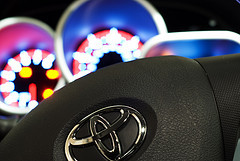Toyota To Pay Out $1.1 Billion To Settle Unintended Acceleration Lawsuit
The settlement, still needs to be approved by the U.S. District Court Judge in California that has been overseeing the case, does not require Toyota to admit any guilt in the matter.
Up to $250 million of the settlement will go to Toyota owners who sold or turned in their vehicles between Sept. 1, 2009, and Dec. 31, 2010, to reimburse them for lost value of their vehicle. A separate fund of $250 million will be established to compensate current owners whose vehicles are not eligible for a brake-override system. Somewhere between $200 million and $400 million will be spent installing brake-override systems on up to 3.25 million vehicles, with another $400 million going toward extending warranties. Then there is the $200 million (give or take) in attorneys’ fees.
The Wall Street Journal estimates that, between recalls, legal costs, lost sales and fines, Toyota has already lost around $2 billion on the unintended acceleration issue. This figure is separate from all the other recalls that came in the aftermath of the UA-related recalls. The settlement means the world’s largest car maker would avoid spending any more cash on a trial.
Though a federal investigation of unintended acceleration incidents concluded that a combination of driver error and loose floormats were frequently to blame, the plaintiffs in the class-action suit alleged that a problem with Toyota’s electronic throttle control system was the underlying cause.
A fatal 2009 accident involving an off-duty California highway patrolman driving a Lexus ES 350 set off a string of recalls by the car maker. The increased public and regulatory scrutiny led Toyota to take a closer look at its previous manufacturing processes and issue further recalls not related to UA.
The Journal reports that Toyota still faces a consumer-protection and fraud suit in Orange County, CA, along with an unfair-business-practice case filed by the attorneys general of 28 states.
Want more consumer news? Visit our parent organization, Consumer Reports, for the latest on scams, recalls, and other consumer issues.


